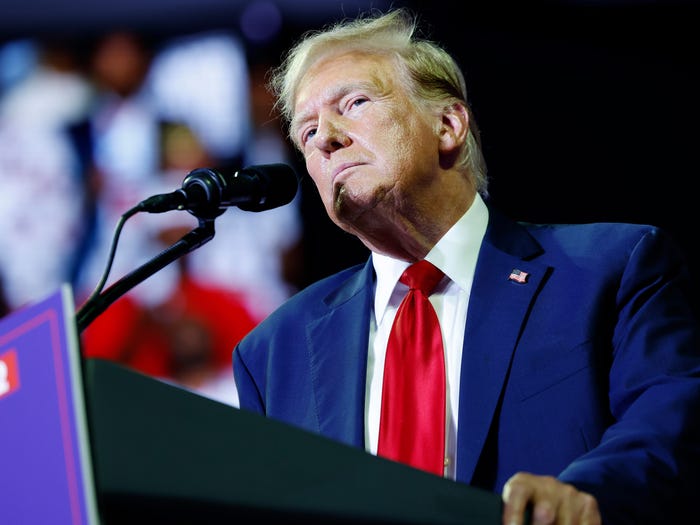Sixteen Nobel Prize-winning economists have issued a stark warning about the potential economic consequences of a second Trump presidency, arguing that his policies could reignite inflation and cause lasting harm to the global economy. This collective stance aligns with the Biden administration’s ongoing narrative that inflation would worsen under Trump.
The economists, including notable figures such as Joseph Stiglitz, George A. Akerlof, and Claudia Goldin, have expressed their concerns in a letter first obtained by Axios. They emphasize that while they hold diverse views on various economic policies, they unanimously agree that Joe Biden’s economic agenda is vastly superior to that of Donald Trump.
Since the summer of 2022, when prices spiked, Democrats have been on the defensive regarding the economy. Despite efforts to rebrand economic successes under the term “Bidenomics” and significant media campaigns, many voters remain unconvinced about the state of the economy. The Biden administration is now shifting to an offensive strategy, highlighting Trump’s proposals, such as imposing new 10% duties on all imports and minimum 60% tariffs on Chinese goods.
The economists’ letter is part of a broader attempt by Biden’s campaign to frame the 2024 election as a choice between the future plans of the two candidates rather than a referendum on Biden’s record. They argue that a second Trump term would negatively impact the U.S.’s economic standing globally and destabilize the domestic economy. They also express concern that Trump’s fiscally irresponsible budgets could reignite inflation, which has recently shown signs of cooling.
Joseph Stiglitz, who spearheaded the letter, elaborated on these concerns in an interview with Business Insider. He noted that the general consensus among economists is that a Trump administration would be more inflationary. The extent of this inflation would depend on the radical nature of Trump’s policies and the composition of Congress. If Trump had a Republican Congress, he would have more leeway to implement his policies, potentially exacerbating inflation.
Stiglitz highlighted several specific policies that could drive inflation higher. One major concern is Trump’s promise of significant tariff increases, which would likely be passed on to consumers, raising prices throughout the supply chain. Another issue is Trump’s proposed tax cuts, which are not offset by spending reductions and would increase the budget deficit, further fueling inflation. Additionally, Trump’s proposed drastic reductions in immigration could tighten the labor market, leading to higher wages and, consequently, higher prices.
The Nobel laureates also pointed to the potential repeal of the Inflation Reduction Act, which includes provisions to lower Medicare prescription drug prices. Without these measures, drug prices could rise, contributing to overall inflation.
Beyond inflation, the economists warn that a Trump presidency could slow GDP growth and exacerbate income inequality. They argue that Trump’s tax policies disproportionately benefit corporations and the wealthy, leaving lower-income individuals with minimal benefits or even tax increases.
The Trump campaign has dismissed the economists’ concerns, with spokesperson Karoline Leavitt stating that Americans do not need “worthless out-of-touch Nobel prize winners” to tell them which president improved their financial situation. She argued that Trump’s pro-growth, pro-energy, and pro-jobs agenda would lower the cost of living and benefit all Americans.
Despite these assurances, the Nobel laureates’ warning underscores the potential risks of a second Trump term. The economists’ collective expertise and analysis suggest that Trump’s policies could lead to higher inflation, slower economic growth, and increased inequality, posing significant challenges for the U.S. economy.
As the 2024 presidential election approaches, the economy is expected to be a central issue. Both candidates are sharpening their approaches to address voters’ economic concerns. Trump has promised to lower the corporate tax rate and eliminate taxes on tipped wages for workers in the leisure and hospitality industries. In contrast, Biden plans to raise taxes on corporations while ensuring that households earning less than $400,000 a year do not see a tax increase.
The federal debt, which has grown significantly under both administrations, looms large over these economic debates. A nonpartisan analysis indicates that tax cuts and spending during Trump’s first term added nearly twice as much to the debt as Biden’s policies.
Biden has presided over a period of solid economic growth and a strong labor market, but stubbornly high inflation has overshadowed these achievements. Many voters blame Biden for high prices, with more than half mistakenly believing the U.S. is in a recession. A recent Fox News survey found that 68% of Americans view the economy as “not so good” or “poor,” although this represents a slight improvement from earlier polls.
The Biden administration is attempting to address voters’ concerns by highlighting the progress made in reducing inflation and acknowledging that more work remains. Treasury Secretary Janet Yellen recently announced a $100 million plan to support affordable housing financing, part of the administration’s efforts to lower prices and improve economic conditions.
As the election draws closer, the debate over economic policies will likely intensify. The Nobel laureates’ warning adds a significant voice to the discussion, emphasizing the potential risks of a second Trump term and the importance of carefully considering the economic implications of each candidate’s proposals.
Source: Axios, Business Insider, CNN



